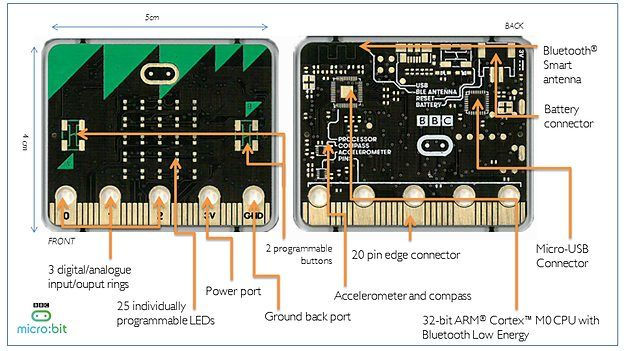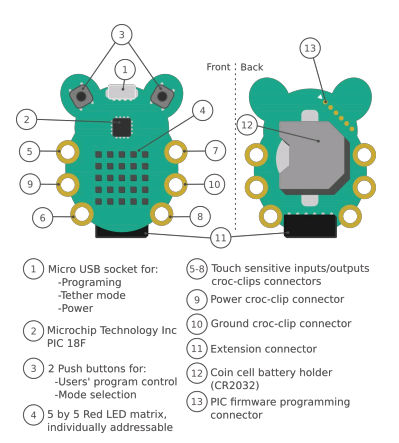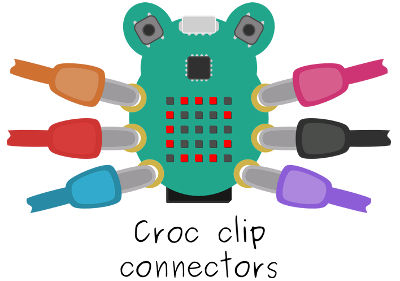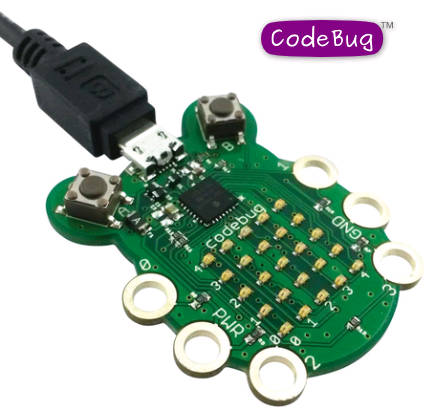| BBC Micro Bit Delay - A Chance For CodeBug? |
| Written by Harry Fairhead |
| Saturday, 19 September 2015 |
|
The BBC has confirmed that the Micro Bit, its tiny development board, will be delayed until the end of 2015. At the same time CodeBug, which offers many of the same features, is now available to buy.
The BBC is hoping to emulate the success it had with the BBC Micro with the BBC Micro Bit. Although the names are similar, the two machines couldn't be more different. The Micro Bit is a small credit card sized machine with an array of LEDs, buttons, accelerometer and Bluetooth which can be used to create simple embedded projects.
More importantly the BBC has plans to give away a Micro Bit to every Year 7 (6th Grade) student in the UK. It was planning to supply a million free devices in October but now this date has been pushed back to "after xmas". The reason? The most troublesome of all computer components - the power supply. No details are available but "a BBC spokesman" is quoted as saying: "As a result of our rigorous testing process, we've decided to make some minor revisions to the device - getting it right for children and teachers before we manufacture one million units is our priority." The original design of the device allowed it to be powered by a button cell, but this was dropped in favour of larger batteries on safety grounds. Now it looks as if the power supply has come back to bite the project!
At the same time Premier Farnell has announced the availability of the Codebug for $20 (£12). This is an example of a successful Kickstarter project, provides many of the features of the BBC Micro Bit and it is available now. Of course, it doesn't have the BBC behind it and so it isn't going to be given away by the million. It all raises the question of should a public corporation like the BBC set itself up in competition to commercial ventures? At least in the case of the original BBC Micro there was some competition to see who would produce the hardware - in the case of the Micro Bit there was no such openness.
Admittedly the Codebug is a more basic board - it has a 25 LED display and two push buttons. It lacks Bluetooth but it does have an expansion bus that supports I2C, SPI and UART interfaces. It also has the trendy croc clip connectors making it easy to make circuits on the fly.
The Codebug has to be connected to a host computer via its USB port and it is programmed using a Scratch like block graphical programming language. The programs have to be downloaded to Codebug but after that it can be run standalone with a CCR2032 button cell installed. The host programmer can be almost anything as long as it has a web browsers because the programming environment is cloud hosted. The notes suggest a Raspberry Pi which is a strange but logical combination. It can also be connected directly to a Pi GPIO and programmed in Python3 which expands its possible application greatly. You can see how easy it is to get started in the video:
There is some concern begin expressed over the degree to which the device is open source and at the moment there are missing schematics and no sign of the source code. So is Codebug a replacement for the MicroBit? It doesn't have the range of sensors built into the board and it isn't free. Any schools interested in getting started with it can buy a classroom set of 30 for £310. Somehow though I think most schools will be waiting to see what the MicroBit has to offer - after all it is free.
UpdateWithin a day or so of the news of the delay, the long awaited Micro Bit web site launched - https://www.microbit.co.uk/ "Today marks the next milestone in the project, and I’m delighted to launch the new beta website for the BBC micro:bit today, developed in collaboration with Microsoft - www.microbit.co.uk – let the coding begin!" The currently available editors are Microsoft Block Editor and Microsoft Touch Develop Editor. Code Kingdom's JavaScript editor and a Python editor from the Python Software Foundation are both "coming soon". You might think that there isn't much point in having the development environment up and running without the hardware, but there is a simulator that can be used to test programs. I suppose this raises the question of whether the hardware is necessary at all! Of course it is to get the students a real taste of the real world, but it still makes you think. More InformationRelated ArticlesTeaching Coding To The Next Generation BBC micro:bit Your Next Computer? BBC Giving Away 1 Million Microcomputers CHIP - $9 Computer To Beat Pi & Arduino Raspberry Pi 2 - Quad Core And Runs Windows Teach Code In School - Before It's Too Late! Computing Teachers Concerned That Pupils Know More Than Them - Updated Computer Science In English Baccalaureate Doctor Who Teaches Programming Four Generations - Video of BBC Micro Software From The 80s Running In Your Browser
To be informed about new articles on I Programmer, install the I Programmer Toolbar, subscribe to the RSS feed, follow us on, Twitter, Facebook, Google+ or Linkedin, or sign up for our weekly newsletter.
Comments
or email your comment to: comments@i-programmer.info
|
| Last Updated ( Saturday, 19 September 2015 ) |






